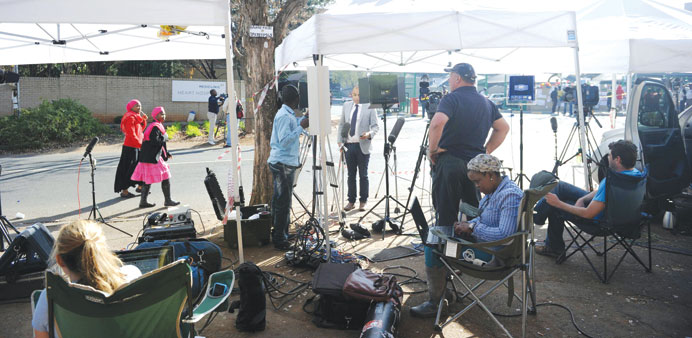|
In the South African township of Soweto, Nelson Mandela’s former neighbours voiced sadness and resignation yesterday that their hero may not have long to live. |
“There will soon come a time when all the medical help won’t work. We have to face that sad reality now,” said James Nhlapo as he served customers in his Soweto grocery store.
There was no sign of tension, no public tears, just heartfelt wishes from Soweto residents that the man who led their country out of decades of white minority rule be at peace.
“Mandela has done well for the country. It’s true that there is none like him, but we have to accept that he won’t live forever,” Nhlapo said.
The news that Mandela was now in a “critical condition” after more than two weeks in hospital suffering a lung infection was met with stoic acceptance in the sprawling township, once at the forefront of anti-apartheid resistance.
Residents were going about their daily lives, hawking goods by the side of the road, while unemployed youths lounged about hoping for something that could earn them some cash.
Mandela’s tiny red brick house—now a museum—was a hive of activity, with tourists streaming in.
“If we believe that he will live forever we are lying to ourselves,” said 24-year-old Tankiso Mohapi. “People must accept that Mandela is old, and with old age comes health problems, just like in anybody else.”
Mandela first lived in Soweto between 1946 and 1958 before his first arrest in 1962 for his underground activities, and returned briefly in 1990 after his release from 27 years in prison.
Now 94, Mandela has been hospitalised four times since December, mostly for the pulmonary condition that has plagued him for years.
The last public images of him, taken in April, showed a frail old man, looking on expressionless as visitors from the ruling ANC smiled for photos.
His poor health has forced South Africans to confront the reality of a future without a man regarded by many as the father of democratic, multi-racial South Africa.
“Mandela has done his job, more than many of us. So why do we still need him around, he is not a monument of some sort,” said 29-year-old Veli Nene.
But he added: “Hearing that his condition has taken a turn for the worst really got me anxious.” There is as much concern about how Mandela goes as when.
“What I’m really praying for is that he does not have to endure much more pain,” said police officer Thabo Moshoeshoe.
South Africans were shocked at the weekend to learn that a military ambulance transporting Mandela to hospital in the early hours of a cold June 8 morning broke down on the highway, stranding him for about 40 minutes.
“I expect those taking care of him to have at least been able to foresee that,” said Moshoeshoe. “Imagine if he died on that highway, that would not have been the best way for him to go.”

